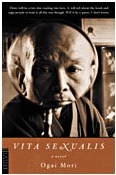
Though banned three weeks after its publication in 1909, Vita Sexualis is far more than a prurient erotic novel. The narrator, a professor of philosophy, wrestles with issues of sexual desire, sex education, and the proper place of sensuality. He tells the story of his own journey into sexual awareness, spanning fifteen years, from his first exposure to erotic woodcuts at the age of six, to his first physical response to a woman, and his eventual encounter with a professional courtesan. Beyond being a poignant account of one boy's coming of age, Vita Sexualis is also an important record of Japan's moral struggles during the cultural upheaval of the last years of the Meiji era. In response to the publication of Vita Sexualis, Ogai Mori was reprimanded by Japan's vice-minister of war.
Author

Mori Ōgai, pseudonym of Mori Rintarō (born February 17, 1862, Tsuwano, Japan—died July 9, 1922, Tokyo), one of the creators of modern Japanese literature. The son of a physician of the aristocratic warrior (samurai) class, Mori Ōgai studied medicine, at first in Tokyo and from 1884 to 1888 in Germany. In 1890 he published the story “Maihime” (“The Dancing Girl”), an account closely based on his own experience of an unhappy attachment between a German girl and a Japanese student in Berlin. It represented a marked departure from the impersonal fiction of preceding generations and initiated a vogue for autobiographical revelations among Japanese writers. Ōgai’s most popular novel, Gan (1911–13; part translation: The Wild Goose), is the story of the undeclared love of a moneylender’s mistress for a medical student who passes by her house each day. Ōgai also translated Hans Christian Andersen’s autobiographical novel Improvisatoren. In 1912 Ōgai was profoundly moved by the suicide of General Nogi Maresuke, following the death of the emperor Meiji, and he turned to historical fiction depicting the samurai code. The heroes of several works are warriors who, like General Nogi, commit suicide in order to follow their masters to the grave. Despite his early confessional writings, Ōgai came to share with his samurai heroes a reluctance to dwell on emotions. His detachment made his later works seem cold, but their strength and integrity were strikingly close to the samurai ideals he so admired.